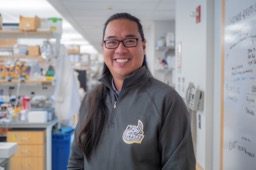What’s for dinner?

Dr. Richard Chi is a cell biologist who is trying to figure out what’s for dinner― at the cellular level. Cells need to eat and drink, just like us! However, instead of the many food options we have at our whim, cellular diet is restricted to a constant intake of environmental fluids and nutrients, referred to as endocytosis. When all the food is gone, cells prolong their lives by deriving essential nutrients from digesting themselves, using a super-power like process called autophagy or self-eating. With great power, however comes great risk—viruses such as HIV, HPV and SARS-CoV-2 exploit endocytosis and autophagy to infect cells and propagate. Likewise, mutations in these pathways can result in human diseases such as Alzheimer’s and Parkinson’s, cardiovascular diseases, and multiple forms of cancer.
While endocytosis and autophagy have traditionally thought to be independent and distinct processes, researchers like Dr. Chi are now discovering a significant interplay. Dr. Chi was awarded a 2021-2022 Faculty Research Grant from UNC Charlotte to understand the food delivery process during endocytosis. Food’s journey to the cellular stomach (lysosome) is often indirect and requires pitstops and detours. A family of proteins called the sorting nexins are thought to aid in this nutrient checkpoint and selectively reroute items, if needed. The sorting nexins, have also been directly implicated in many aspects of autophagy, however their functions in the process are unclear. Dr. Chi was also awarded a National Science Foundation Grant to determine how sorting nexins participate in autophagy. Dr. Chi’s NSF project includes impact outside the laboratory by improving undergraduate curriculum by the developing 3D-printing and Virtual Reality (VR) inquiry-based learning modules centered on macromolecular structure and function.